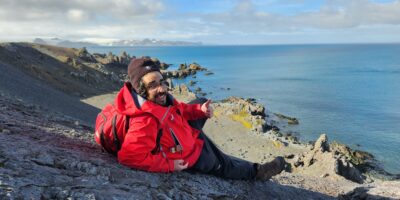Fulbright Scholar and Marie Curie Fellow Joins Roseman
In this faculty spotlight, College of Dental Medicine faculty, Dr. Jaime Cabrera-Pardo discusses his education, career, and decision to teach at Roseman University.

In June of 2024, Dr. Jaime Cabrera-Pardo joined Roseman University as an adjunct faculty member. His assignment has three main functions: conducting a clinical research trial on tranexamic acid (TXA), leading CORE research, and helping students and residents with their research.
Dr. Cabrera-Pardo was initially drawn to this role because of the opportunity to use his background in chemistry and biochemistry to advance healthcare. He is particularly excited about the opportunity to work in clinical trials. “The TXA study [is] based on a drug that has been proved in study but now we’re trying an oral wash format,” he explained. “That study is something new to me. I’ve never done a clinical study before.”
The most gratifying part of his job is working with the patients. “It is rewarding,” Dr. Cabrera-Pardo observed, “because I feel that what we are doing helps them to improve their oral health and health in general.”
Dr. Cabrera-Pardo began his studies with a bachelor’s degree in biochemistry at the Universidad de Concepción in Chile. He planned to complete his doctorate in Chile as well, but his plans changed when a professor pushed him to apply for a scholarship to study in the United States.
In 2009, he was awarded a Fulbright scholarship to pursue a Ph.D. in organic chemistry at the University of Chicago. Initially, Dr. Cabrera-Pardo didn’t understand the significance of his achievement. “I had no idea what it meant [to receive a Fulbright scholarship] until later on,” he recalled. “I also didn’t know how good the University of Chicago [is].”
After finishing his doctoral research, Dr. Cabrera-Pardo was awarded a Marie Curie Fellowship to complete a postdoctoral fellowship in organic chemistry at the University of Cambridge in the United Kingdom. “After being in the U.S. for four years, I knew what this type of fellowship meant” he explained. “So, it was more rewarding.”
Dr. Cabrera-Pardo’s experiences studying abroad changed him significantly. “I didn’t really know what hard work and scientific passion was until I was in these places,” he observed. “Those places are top-notch institutions in the world. [The] people who work in them are remarkable.”
After completing his education, Dr. Cabrera-Pardo returned to Chile and started a natural product chemistry lab where he studied rare fungi. His work took him to both Patagonia and Antarctica.
When asked what it was like to visit Patagonia, he remarked, “It’s kind of like a magical place. I could not describe it better than that.”
While in Patagonia, Dr. Cabrera-Pardo’s team spent their days hiking through different types of forests in search of fungal specimens. And by the close of their project, they had “found a molecule that showed very strong neuroprotective activity on cell-based assays against Alzheimer’s disease.” These findings were published in the Journal of Alzheimer’s Disease.
But being at the Profesor Julio Escudero Base in Antarctica was a different experience altogether. “There were nice days,” he recalled, “But [on] nice days in Antarctica, you have to wear two pairs of socks, nice boots, three layers of trousers, and three layers on your chest (a t-shirt, a pullover, and a jacket).” On cold days, they could not even go outside.